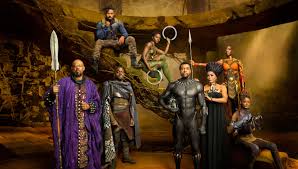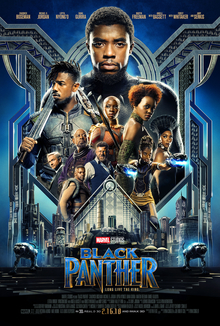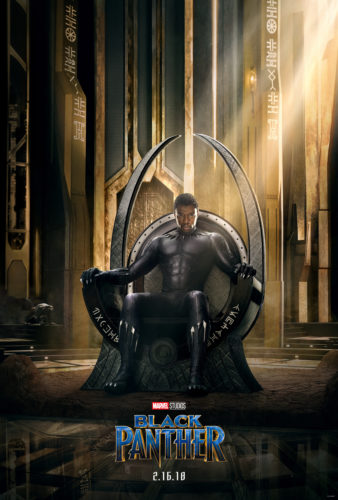
Within the world of fantasy, magic, superheroes, and villains, the latest installments made for television and movies have created much hype and are generating much excitement. The last two years have brought about some amazing and much anticipated programming that fit into these genres, from new Star Wars films to new renditions of Superwoman.
“The world is changing…..” – Black Panther

Black Panther Movie
During the past two years, there has also been some rather exciting developments in the shifting representation of the typical superhero, and this has brought about a wide variety of discussions and theories on the importance of representation in Sci-Fi, fantasy, and superhero genres. With the upcoming February release of Marvel’s Black Panther and the debut of the CW network’s new show Black Lightning, it seems that conversations about much-needed superhero diversity are happening everywhere
A record number of pre-sale tickets for Black Panther were sold last week and threads all over social media started the process of planning group trips to the show. Several sources indicate that Black Panther broke the record previously held by Captain America: Civil War for the most pre-sale tickets sold on the first day of any of the Marvel movies.
Interestingly, the Black Panther movie is set to release on February 16, the first day of the much anticipated pan-Pagan PantheaCon convention in San Jose, California. Due to that fact, many people are talking about making choices around seeing the movie on opening weekend and missing parts of the convention.

So what importance does this have in greater society, and why do stories like this impact the Pagan community? Why are so many Pagans talking about this movie? I reached out to a few people to ask about their reasoning for seeing the movie, and the excitement they have for this pending reflection of Black cinema.
Black Panther, the movie, is, to me, an antidote to the current regime. It is about a community and leaders of a community working for the benefit of the entire group, not the individual egos. It is, as a movie, a time to celebrate Black Joy in a culture of anti-Blackness. – Jacki Chuculate
It is important for me to take my children to see the movie so they can know what it feels like to see a film that betrays a world that includes them. We walk around in our own niche pockets of community to see people like us, but when we look to media we rarely see ourselves. It is dis-empowering. This movie tells us that we can be the heroes, we are strong, and there is strength in our beauty. And with Wakanda being the most technologically advanced country in the world, it pushes against the belief that Western society is more advanced than everyone else. Subtle things like that are empowering beyond words. – Morohunkolafun Nenge
Because cinematic history has a bedrock in appropriation of black culture and conscripting black talent to play caricatures of themselves and their culture to profit white executives who continued to deny them the fruits their labor generated or helped push technology to really allow them to shine onscreen.
Despite white supremacy clearly being a key factor in cinema, black excellence would NOT be hidden. Or denied.
Black Panther to me is precipice black excellence. I won’t say peak because we know now that if a major studio has this, we deserve more.- Xochiquetzal Duti Odinsdottir
The biggest part of Black Panther I’m excited for is seeing the Dorja Milaje in action. Not just because they’re “Black women warriors,” but the movie promises to show their inner motivations for why they serve. Black women aren’t going to be window dressing in this movie – they’re going to be just as much a superhero as T’Challa will be. And I’m totally there for this! – Tanisia Greer
From the moment I first heard about the Black Panther movie I was excited to see it. There are lots of really great reasons to be excited about it, the talented cast of actors and the gorgeous, lush costumes, the fact that a black cast and black-centric story is getting the superhero blockbuster treatment – it marks a milestone, and an important one, in the ways in which I hope that our society is changing.
There’s a stunning range of beauty and diversity in the world, and for too long Hollywood has only shown one type, one version, on ongoing Ever-the-Sameness. I hope that Black Panther marks a change in that dynamic, and brings about a future in which diversity of stories and faces are given a place front and center. But mostly I’m looking forward to what comes after the movie – when children will dress up as their favorite characters, and be able to imagine a world where people who look like them are Heroes on Adventures and Saving the World. – Stephanie Kjer

Images of powerful Black individuals, who are not gangsters, slaves, criminals,or villains, are needed on screen for a multitude of reasons. Such images provide an increase in our opportunity to see faces of color and also defy the common stereotypical television snapshot of the destitute, poverty stricken, and uneducated individuals in need of rescuing by the privileged class. As such, the images serve to change a narrative that has become ingrained in the subconscious of how people imagine Blackness.
Representation matters in every aspect of life. This increasing visibility and the displays of such powerful images, real or fiction, provide reflections of our own power and can be a useful tool in the process of magic, spirituality, and self actualization.
It will be interesting to see what conversations are started within the Pagan community as well as within greater society, as the hype takes over the movie world. We have often seen the momentum of pop culture find its way into our everyday references, and even in the practice of magic.
Taylor Ellwood and Emily Carlin are two Pagan authors known for their use of pop culture in magical practices. And while the full impact of this current wave of diverse superheroes has not been felt, the recent newly-imagined renditions of Wonder Woman and other similar superheroes have made their way to the altars of many modern practitioners.
Whether we will see archetypal practices in connection with Luke Cage, Black Lightning or Black Panther is yet to be seen, but these shows do open a great deal of possibilities in magical work. In light of current socio-political issues, invoking the power of some of these fictional, magical figures could be very useful.
And, at the same time, it doesn’t hurt to see correlations of our superheroes reflecting back to us the power of our ancestors.
After some more reflection, I came up with my own top five reasons Black Panther and the rise of diverse superheroes supports the changing dialogue around embracing differences within the Pagan community.
- Depicting the culture and the faces of powerful Black people on screen in a cinematic, epic, and mainstream way brings a much-needed conversation into various communities that are often isolated from communities of color. Movies that feature casts with a majority of people of color or where the plot is focused on cultured-elements, typically only appeal to or are only marketed to a niche audience who may be looking for those culture-specific experiences. As a result the conversations and excitement often stay within Black or urban communities. Mainstream representation, as in Black Panther, brings that element of something different to the forefront of what everyone, everywhere, is talking about.
- Superheroes are often the outcasts of society because of their special powers, until they utilize those gifts to bring about change. Often within magical communities this is a parallel experience, to which many people can relate. Relatability often brings the opportunity for understanding. Mainstream reflections that celebrate cultural differences in others offer an opportunity to explore this idea in a fun and normalized way. This is often easier than a typical conversation about our differences.
- There is a strong emphasis on the power of the Black woman in this film. While Wonder Woman brought incredible magic to the screen in 2017, there wasn’t a large representation of women of color in the movie. In Black Panther women of color are at the forefront of the narrative and the driving force of power. The king’s bodyguards are a group of Wakandan women called the Dora Milaje and they are fierce. Divine feminism shown in different skin colors and contexts will continue to push the shift of how we see feminine power and the role of the warrioress. The strength of the Black woman throughout history has been ignored in the accepted standards of womanhood, which has been fashioned on European characteristics. This movie doesn’t follow the same pattern of stereotypical societal norms for such beauty standards and focuses on the immense power and massive beauty of the African diaspora.
- The Pagan community has a history of activism to support change in areas of women’s rights, religious tolerance, interfaith work and caring for the earth. Recent socio-political challenges have brought about a more involved faction of political activism and anti-racism work as well. A huge release of a movie of this proportion, with a majority Black and Brown cast, in a major movie franchise is unheard of until now. The Pagan community financially supporting a Marvel movie is more complex than just purchasing a movie ticket. It is also buying into a movement that honors the past and current resistance against systemic injustice and the anti-black sentiment that has been a part of the landscape of our history.
- Paganism as an umbrella culture often separates itself from the cultures, folklore, Gods, and practices of Africa. Modern Paganism today is largely molded with an overculture of Eurocentric practices, beliefs, and symbology. In this new movie we will be immersed in a world that is African in many different ways. It is not just about the ethnicity of the actors, but the world of Wakanda as a African nation that is beautiful, technologically advanced, and surrounded by images that represent the cultures of the Motherland. Recognition of the power of Africa and its descendants has the ability to evoke a new level of respect for others within our communities. It also opens up curiosity and interest in the folklore of the great continent.

Currently, there are numerous opinion pieces, interviews, and insights into the various levels of impact this movie might have on the superhero community and the types of discussions already happening. One of my favorite pieces on this subject is titled Wakanda Forever: On the Importance of Black Panther and written by Clarkisha Kent. Featurend on The Root, the article speaks truth about the empowerment of Black people with a little humor:
Indeed. Come Feb. 16, 2018, black people across the African Diaspora will pack the theaters with our ceiling-touching geles, our brightly colored dashikis, and our sharpest black-and-white attire, and lose our collective black minds. All for the purpose of celebrating the blackity blackness that will be the premiere of Black Panther.<
To be clear, this hype is incredibly warranted for a variety of reasons. Not only is a Black Panther film wildly overdue, but the titular character has social, historical and cultural significance that I can honestly talk about all day.
In a different quote, from a Rolling Stone article titledBlack Superheroes Matter: Why a ‘Black Panther’ Movie Is Revolutionary, it reflects on why this is more than just a common superhero movie or the next hype that will just pass:
Yet Black Panther already feels different from all of this. Coogler has set out to do something with the modern black superhero that all previous iterations have fallen short of doing: making it respectable, imaginative and powerful. The Afro-punk aesthetic, the unapologetic black swagger, the miniscule appearances from non-black characters – it’s an important resetting of a standard of what’s possible around creating a mythology for a black superhero. The trailers point to a new direction for depicting not only black superheroes, but also how we imagine our heroes. He’s not being played for laughs. He’s not a sidekick or born out of dire circumstances. His story, one of an ingrained birthright, legacy and royalty is a stark difference for how we tend to treat most black superheroes – and black superhero movies.
As we move into 2018 there continues to be a lot of discussions and plans for revolutionary actions to change the current landscape of society in every arena. Individually or collectively Pagans across the U.S. and the world will be deciding what role they want to play in the unfolding picture of what is and what is to come in what seems like our own science fiction movie.
We engage in change actions in a variety of ways, at our altars, in the polls, and even in the movies. Change is happening….the world is changing.
* * *
The views and opinions expressed by our diverse panel of columnists and guest writers represent the many diverging perspectives held within the global Pagan, Heathen and polytheist communities, but do not necessarily reflect the views of The Wild Hunt Inc. or its management.
The Wild Hunt is not responsible for links to external content.
To join a conversation on this post:
Visit our The Wild Hunt subreddit! Point your favorite browser to https://www.reddit.com/r/The_Wild_Hunt_News/, then click “JOIN”. Make sure to click the bell, too, to be notified of new articles posted to our subreddit.